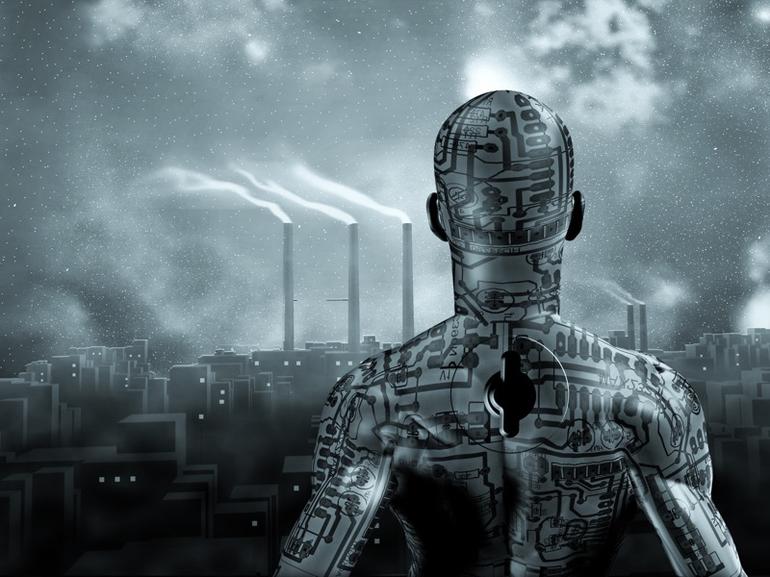
The machines may be coming for your job, but they're sure not very good at it. As Nick Carr put it, "You can see the robot age everywhere but in the labor statistics." In fact, even as the market has gone frothy over machine learning (ML) and artificial intelligence (AI), the US has registered its 86th straight month of increased employment. It's possible that machines will eradicate some lower-skilled jobs (with an English degree serving as inoculation) but, on balance, the evidence for a robot takeover is missing in action.
The data doesn't favor robots
Indeed, as Wall Street Journal columnist Greg Ip has said, the contention that AI will rapidly displace jobs is "baffling and misguided":
Baffling because it's starkly at odds with the evidence, and misguided because it completely misses the problem: robots aren't destroying enough jobs. Too many sectors, such as health care or personal services, are so resistant to automation that they are holding back the entire country's standard of living.
Ip points to the US's current 4.4% unemployment rate, which sits below what most economists would call "full employment." In other words, even as AI takes off, everyone who wants a job may have one. This hardly sounds like a robot-themed slasher film.
SEE: Jobs vs. AI: What happens when everything is automated? (ZDNet)
Worse still for the "robots are coming!" alarmists, the data actually suggests we're becoming less automated, not more. Ip said: "If automation were rapidly displacing workers, the productivity of the remaining workers ought to be growing rapidly. Instead, growth in productivity—worker output per hour—has been dismal in almost every sector, including manufacturing." We certainly have more machines, but we don't seem to be making much of them. Has the computer age given us more cause to vegetate in front of a screen, rather than use those screens to increase vegetation?
People vs machine
Another Wall Street Journal article (Why Big Data Hasn't Yet Made a Dent on Farms) clearly argues that "the [big data] revolution has been slow to catch on" because "Many farmers who used the digital services found it difficult to digest the mountains of information and figure out how to put it to use. Many others simply weren't sold on the idea, or couldn't afford the investment as crop prices fell."
People, in short, haven't kept up with the promise of big data and its AI-filled future. As the article continued, "[F]armers have been deluged with data coming from countless sources, from soil sensors to outer space. But even if farmers want information from drones, satellites and on-ground sensors, it is hard to get the most out of them."
SEE: How robots and automation may take on the jobs people don't want to do (Tech Pro Research)
This isn't simply an agriculture problem. The hype of big data has far surpassed its reality. Gartner analyst Nick Heudecker nailed it when he pointed out that while 50% of enterprises planned to use big data, only 15% or so actually make it into production, a percentage that is likely to be even worse for machine learning. It turns out that it's really hard to harness big, messy data, and throwing a bunch of machines at it compounds, rather than helps, the problem.
On this issue, Ip wrote:
This calls for a change in priorities. Instead of worrying about robots destroying jobs, business leaders need to figure out how to use them more, especially in low-productivity sectors. Someday robots may replace truck drivers, but it's much more urgent to make existing drivers, who are in short supply, more efficient. Clean energy advocates boast about how many people work in solar power when they should be trying to reduce the labor, and thus cost, involved.
These are areas where machines can help, but we first need to recalibrate our expectations downward a notch (or 10). The goal isn't to displace workers but, rather, to complement them, even in low-skilled jobs.
Also see
- STEM is great, but here's why an English degree might be a smarter bet (TechRepublic)
- AI pioneer: AI will definitely kill jobs, but that's OK (TechRepublic)
- Special report: How to automate the enterprise (free ebook) (TechRepublic)
- Stop trying to force students into STEM fields (TechRepublic)
- Video: Cognizant deal: Tech success requires a liberal arts degree after all (ZDNet)
- Jobs vs. AI: What happens when everything is automated? (ZDNet)
- McKinsey: AI, jobs, and workforce automation (ZDNet)
- How robots and automation may take on the jobs people don't want to do (Tech Pro Research)
Full Bio
Matt Asay is a veteran technology columnist who has written for CNET, ReadWrite, and other tech media. Asay has also held a variety of executive roles with leading mobile and big data software companies.




